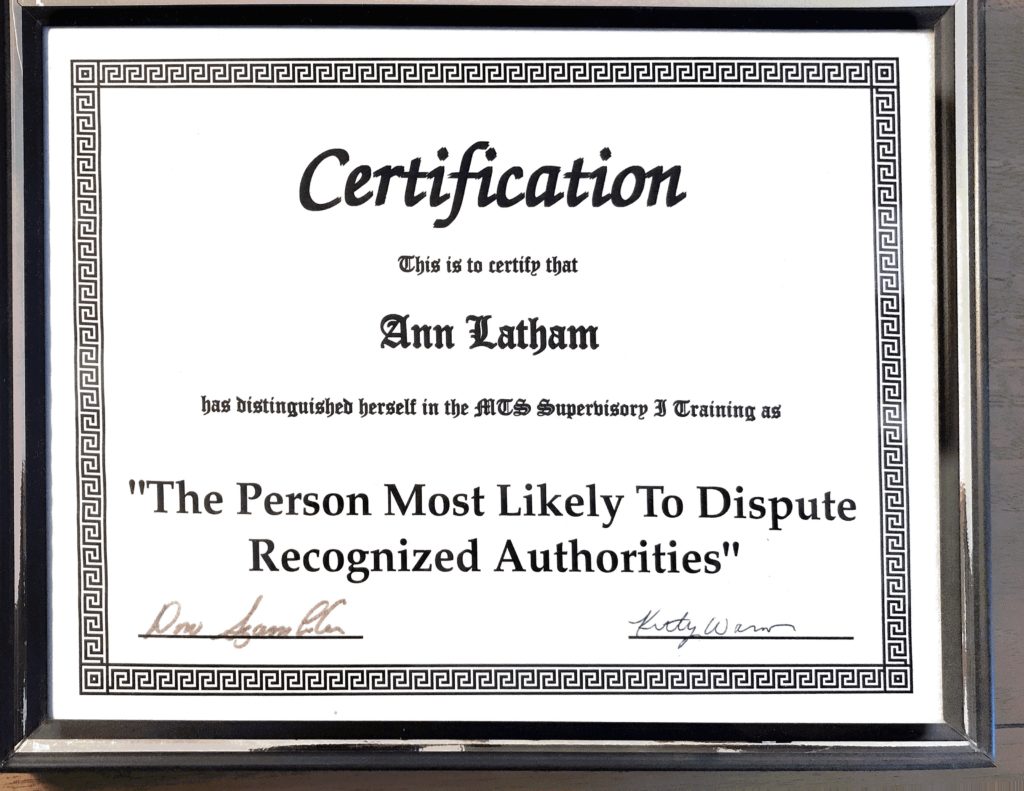 Of all the corporate certificates I’ve ever received, the one I’ve valued above all others is the one that reads “The Person Most Likely To Dispute Recognized Authorities.” I received this honor for my relentless questions about the evidence and conclusions presented from studies by PhDs representing venerable institutions such as Harvard and Stanford. Looking back, I suppose I was completely exasperating.
Of all the corporate certificates I’ve ever received, the one I’ve valued above all others is the one that reads “The Person Most Likely To Dispute Recognized Authorities.” I received this honor for my relentless questions about the evidence and conclusions presented from studies by PhDs representing venerable institutions such as Harvard and Stanford. Looking back, I suppose I was completely exasperating.
But let’s be clear here! I didn’t ask questions because I thought I was smarter than those recognized authorities. It certainly wasn’t because I thought I knew more than the experts. What I questioned was the applicability of those premises and conclusions to the topics at hand. To me, there was not a clear link. The situations were different and the conclusions didn’t follow. That much was perfectly clear to me!

That certificate, which may have been meant as a bit of a reprimand, made me proud. Proud that I was driven by a desire to understand. Proud that I stuck to my guns and spoke up to challenge the assumptions. Proud that I didn’t bow in submission at the mention of towering credentials despite being relatively young and inexperienced.
It was clarity that gave me that confidence. The disconnects were clear. The opportunity for clarification was glaring. The consequences of confusion were significant. I owed it to myself and the others in the group to create clarity. I have a passion for clarity and it fuels my self-confidence. Here are nine of the ways it does that:
- When you are clear about what is most important and what isn’t, you are more likely to:
- keep the goal in mind when making decisions.
- feel and express your confidence in those decisions.
- speak up when it matters and you see problems.
- ask critical questions to clarify perspectives, facts, and options.
- When you are clear about exactly what you want to accomplish, you are:
- more confident in your actions and determined to succeed.
- more able to adjust your methods as needed without waffling.
- When you are clear that collaboration is more important than being right, you will confidently:
- set aside your personal opinions and needs so you can really listen and learn.
- ferret out the intentions, priorities, and concerns of others.
- find common ground.
- recognize the moment when it is possible to move forward.
- When you are clear about your strengths and weaknesses, you are more likely to:
- acknowledge your own humanity and forgive yourself your weaknesses.
- ask for help when you need it.
- trust that people will respect you for your strengths and contributions despite your weaknesses.
- When you are clear about the difference between self-worth and self-confidence, you are more likely to recognize that:
- confidence is situational and depends on your knowledge and familiarity with the matters at hand.
- no one has the knowledge and experience to be truly confident in every situation.
- feeling inadequate in specific circumstances should have no bearing on your self-worth–your sense of your own value as a person.
- you are no less of a person because of the accomplishments of others.
- it is okay to admit your lack of familiarity and knowledge and defer to others without loss of personal pride.
- When you are clear about the difference between personal characteristics and observable behavior, you can provide feedback effectively by:
- confidently describing undesirable actions and the impact of those actions without judgment.
- collaborating to identify remedial actions that might be appropriate and ways to prevent a recurrence.
- leaving everyone with their self-respect intact and looking forward to a smoother, more effective future.
- When you are clear about the distinct steps of the cognitive processes most important for group progress (e.g., how to SOAR through decisions), you can confidently:
- get everyone focused on the same paragraph of the same page.
- delegate without fear of micromanaging or losing control.
- prevent rework and mistakes.
- move the group forward with great speed and buy-in.
- When you are clear about risks and what can go wrong, you can:
- avoid the anger and personal reprisals you unleash on yourself when you are blindsided.
- take prudent risks with confidence.
- be prepared with preventive and contingent actions.
- recognize early warning signs that allow you to react quickly and confidently to minimize problems.
- Most important of all, when you are generally clear, you will:
- recognize when you are unclear.
- refuse to jump in or wander around until you can establish clarity of purpose and process.
- confidently determine “What are we trying to accomplish, why, and how will we know when we’ve succeeded?”
- make the distinctions that make the difference between wasting time and moving forward quickly and effectively.
Clarity creates confidence. The confidence to pause and find your way. The confidence to say no and stick to your guns. The confidence to speak up to prevent problems or defend against poor decisions and harmful actions. The confidence to stand alone. The confidence to be proactive when silence might seem safer. The confidence to take prudent risks and embrace new challenges. Learn to create clarity and your self-confidence will soar.
Ann Latham is an expert on strategic clarity and author of The Clarity Papers.
Take The Clarity Quiz! Actually, take them all! Download a free copy of The Clarity Quiz Collection.
![]()
This article first appeared on Forbes, April 29th, 2018.


Comments are closed.